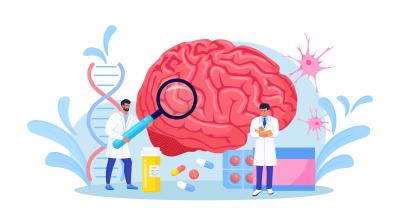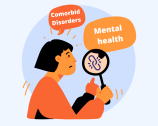Bridging Genes and Brains: A New Frontier in Public Health
Bridging Genes and Brains: A New Frontier in Public Health

Public health keeps communities healthy by preventing disease, promoting well-being, and ensuring everyone has access to essential care. While many people link public health to vaccination campaigns or clean water, mental health is equally crucial. My research sits at the intersection of mental health, neuroimaging, and genetics. By studying how the brain functions, and how genes influence it, I aim to detect and treat conditions before they become debilitating.
Neuroimaging methods, such as MRI, reveal both the brain’s structure and how different regions communicate. One focus of my work is “brain network dynamics,” which refers to how these regions interact and shift over time. For instance, the areas responsible for emotional processing may coordinate differently when someone experiences stress or recalls tough memories. By comparing these patterns across many people, researchers can often spot warning signs of disorders like depression or anxiety before they fully emerge. Such insights pave the way for more proactive and personalized treatments.
My research specifically involves bridging advanced neuroimaging findings, genetic data, and real-world applications. Through collaborations with clinics, we collect brain imaging results and analyze them alongside genetic profiles to identify early markers of mental health issues. Our goal is to translate these discoveries into community-based measures—such as routine screenings or stress-reduction programs—that help people at heightened risk. The hope is that earlier detection, informed by both brain scans and genetic information, will cut down on severe mental health episodes and reduce the overall burden on healthcare systems.
Genetics is integral to my work. Rather than focusing on a single gene, we study how multiple genes act together to influence risk. This is measured through Polygenic Risk Scores (PRS), which combine thousands of genetic variants into one summary figure. A high PRS may indicate an increased chance of certain mental health challenges, but it is never the entire story. Environmental factors and personal resilience play equally large roles, meaning not everyone with a high PRS will develop a disorder. Instead, PRS helps us target resources to those who could benefit most from early intervention.
In practice, imagine someone who has a high PRS for anxiety. If we also see changes in their brain network dynamics that suggest rising stress or mood issues, we can intervene sooner—potentially with therapy, lifestyle recommendations, or medication. This approach aims to prevent symptoms from escalating. In contrast, waiting until the person reaches a crisis often leads to more complex and costly treatments.
From a public health standpoint, the benefits are significant. Early detection typically requires fewer resources, reduces the strain on mental health services, and prevents prolonged suffering. By connecting brain imaging data with genetic profiles, healthcare providers can deliver care tailored to each individual’s unique risk factors. Over time, this could mean shorter hospital stays, more effective therapies, and a healthier community overall.
My research also highlights the importance of education. When people learn that mental health conditions stem from biological factors, rather than personal failings, stigma goes down. This can encourage more individuals to seek help early. Public health campaigns might emphasize how PRS and brain imaging guide prevention—much like mammograms and screenings do for cancer. Through greater awareness, we can foster a culture that treats mental health proactively.
Ultimately, combining neuroimaging, genetics, and public health initiatives can change how we tackle mental health issues. Instead of reacting only after crises occur, we can identify those at higher risk, intervene earlier, and offer the right care before conditions escalate. My work aims to push this approach forward, using data-driven insights to improve mental well-being on both individual and societal levels.
By merging discoveries in brain science with genetics, I hope to make mental health interventions as common as other preventive measures. Whether through refining diagnostic tools, influencing policies, or guiding programs, these findings can reshape mental healthcare. In doing so, we strengthen public health, reduce costs, and most importantly, improve lives.
Looking ahead, I plan to collaborate with local health departments and mental health clinics to implement early screening programs based on these combined brain-imaging and PRS findings. By training practitioners to interpret risk scores and subtle changes in brain connectivity, we can better target interventions and build resilience, further reducing negative outcomes and improving community well-being.





















